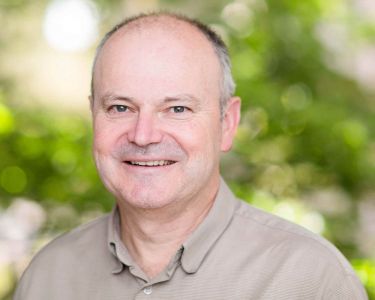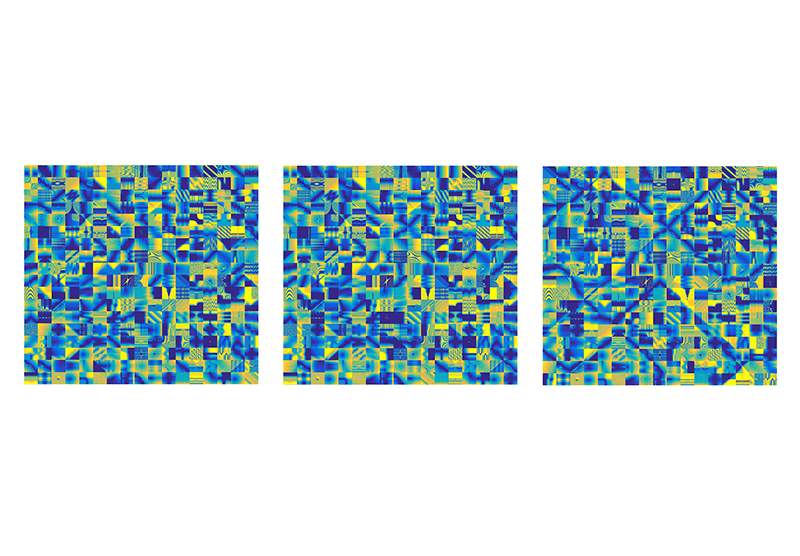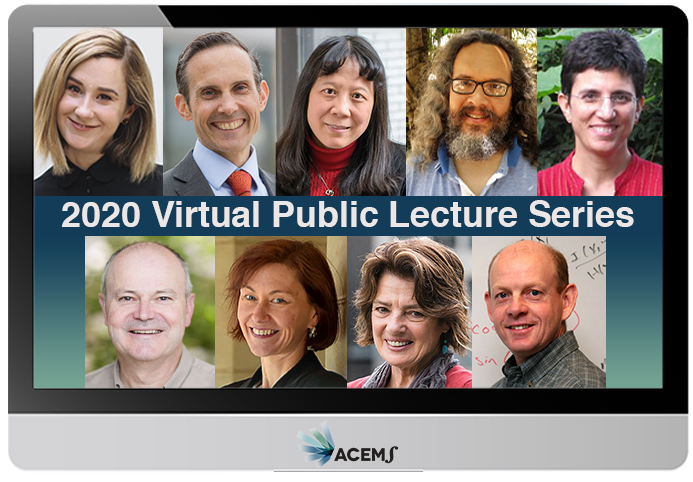
Public Lecture Series
The ACEMS Public Lecture Series engages with the broader community and is designed to inspire, challenge and inform the general public covering a diverse range of topics that include the latest research and findings on new developments in mathematics and statistics.
Previously, the public lecture program has been delivered at individual ACEMS nodes, but as with most public facing events and activities in 2020, the Centre saw the opportunity to pivot the lectures and present them virtually to the public using Zoom Webinar as the viewing platform. Hosted virtually by different ACEMS members, the lectures included a diverse mix of topics and local and internationally based presenters, all leaders in their field and part of the ACEMS wider community. Whilst networking via the usual pre-lecture reception was not possible, the virtual format provided a program of lectures accessible to and viewed by a much wider audience than is possible at individual nodes.
Each of the lectures were scheduled in the lunchtime timeslot locally, and although timezones were a factor, it was wonderful to attract the broader global mathematical and statistical community including audiences across Australia, as well as North and South America, Europe, Britain, Asia, India, Middle East and New Zealand. ACEMS was incredibly impressed with the interest in the lecture series with more than 1200 individual logons across the 9-lecture series, and with dynamic discussion via the Q & A feature.

Professor David Balding
The ACEMS Public Lecture Series continued to showcase a wide range of topics in 2020, the first of which featured Professor David Balding (Professor in Statistical Genomics and Director of the Melbourne Integrative Genomics Centre) and his work in forensic genetics. David’s expertise is in the fascinating domain of problems related to genetics, in particular DNA profile evidence. His talk provided an overview of the many courtroom experiences in the UK and Scotland about evaluation of the weight of evidence in the population genetics aspects. David spoke about his recent work on inference using unilinear genetic markers which has led him to deviate away from standard Bayesian approaches.

Negentropy Triptych artwork by Professor Kate Smith-Miles

Presenters (top left to bottom right) Ellen Broad, Dr Andrew Leigh, Professor Xihong Lin, Dr Juan Ortiz, Professor Galit Shmueli, Professor David Balding, Professor Kate Smith-Miles, Professor Louise Ryan and Professor Shane Henderson]
The 2021 series will again be presented virtually and include a stimulating program of interesting and thought-provoking lectures from leading national and international researchers accessible to the mathematics and statistics community and the general public.
The Lectures
| Date | Speaker | Title and Abstract |
|---|---|---|
|
26 May 2020 |
Professor David Balding, Director of Melbourne Integrative Genomics Centre at the University of Melbourne and ACEMS Associate Investigator |
How to evaluate evidence in a criminal courtroom Courts have long struggled with weighing up evidence of a scientific nature, and these problems came to the fore when the introduction of DNA evidence was accompanied by major controversies. Contributions to the debate from scientists (including statisticians) made it clear that many of them were also very poor at understanding evidential weight, and that the paradigms of classical statistics were unsuited to the criminal justice setting and added to the confusion. Slowly, progress has been made using probabilistic modelling aligned with the Bayesian approach to statistical inference, and best practice in evaluating forensic evidence now has lessons for other areas of science, including a response to the so-called replication crisis in science. |
|
1 July 2020 |
Professor Xihong Lin, Coordinating Director of the Program in Quantitative Genomics of Harvard TH Chan School of Public Health, and Professor of Statistics at Harvard University |
Learning from COVID 19 – from Wuhan, USA and the World In this lecture, Professor Lin provided a historical overview of the epidemic in Wuhan and analysis results of 32,000 lab-confirmed COVID-19 cases in Wuhan to estimate the transmission rates and evaluate the effects of different public health interventions on controlling the COVID-19 outbreak, as well as summarizing the epidemiological characteristics of the cases. Professor Lin also presented the estimated transmission rates in the USA and other countries and intervention effects using social distancing, test-trace-isolate strategies. Including the analysis results of >500,000 participants of the HowWeFeel project on symptoms and health conditions in USA, and discussed the risk factors of the epidemic. Strategies and challenges for different types of tests, such as PCR and antibody tests, contact tracing, and handling asymptomatic and pre-symptomatic cases as the main priorities for the community. |
|
7 July 2020 |
Hon Dr Andrew Leigh MP, Federal Member for Fenner in the ACT |
The Second Convict Age: Explaining the return of mass imprisonment in Australia Constructing a new series of incarceration rates from 1860 to 2018, Dr Leigh finds that Australia now incarcerates a greater share of the adult population than at any point since the late nineteenth century. Much of this increase has occurred since the mid-1980s with incarceration rates for Indigenous Australians having also risen dramatically. The recent increase in the Australian prison population does not seem to be due to crime rates, which have mostly declined over the past generation. Instead, higher reporting rates, stricter policing practices, tougher sentencing laws, and more stringent bail laws appear to be the main drivers of Australia’s growing prison population. |
|
14 July 2020 |
Dr Juan Ortiz, ACEMS Partner Investigator from the Australian Institute of Marine Science |
Looking at the Great Barrier Reef from Organisms to Ecosystems The Great Barrier Reef is an inherently complex system with a myriad of physical, biological and anthropogenic interactions. This complexity presents a challenge for understanding observed patterns and predicting their consequences. While the management of the Great Barrier Reef has consistently been underpinned by scientific research, often the process of translating empirical evidence into ecologically sound recommendations involves the amalgamation of multiple lines of evidence through a detective-like process. In this lecture , Dr Ortiz detailed how he has used relatively simple math to help understand and contextualize patterns in empirical and experimental observations to reach conclusions that are relevant for the management of the Great Barrier Reef. |
|
27 Aug 2020 |
Professor Galit Shmueli, National Tsing Hua University, Taiwan |
“Improving” Prediction of Human Behaviour Using Behaviour Modification Predictions are sold to third parties who utilize them for personalisation, targeting and other decision-making. Because better predictions translate into higher financial value, platforms are incentivised to reduce prediction errors. Beyond improving algorithms and data, platforms can stealthily achieve 'better' predictions by 'pushing' users' outcomes towards their predicted values, using behavior modification techniques, thereby demonstrating more certain predictions. Prof Shmueli discussed several dilemmas, challenges, and trade-offs related to behavioral big data. |
|
2 Sept 2020 |
Professor Shane Henderson, Cornell University |
Analytics and Bikes: Riding Tandem with Motivate to Improve Mobility In this lecture, Professor Henderson discussed work that he and his team undertook with Motivate, the operator of bike sharing systems in New York, Chicago, and San Francisco, to innovate methods for managing both their day-to-day operations and to provide insights into several central issues in their system design. Key questions tackled related to the placement of bikes and docks, methods to handle surges in demand during peak periods, and the design of a crowd-sourcing scheme to improve "balance" in the system. The work has resulted in fundamental changes and financial and environment impacts, in the way Motivate runs its bike-sharing programs. |
|
7 Oct 2020 |
Professor Kate Smith-Miles, ACEMS Chief Investigator, UniMelb |
When mathematics becomes art…the unexpected beauty of self-evolving patterns In this lecture, Professor Smith-Miles described how her research quest to generate mathematical functions that are challenging and “stress-test” optimisation algorithms led to a large collection of intricate and beautiful 2D images, arising as contour plots of mathematical functions that have been mathematically Professor Smith-Miles and her co-author Mario Andres Munoz Acosta arranged many images in an array, but noticed the formation of background structure, as localised connections between the images, depending on the arrangement. Surveying friends about their aesthetic preferences for various arrangements revealed great diversity of taste, and interesting relationships between personality traits and aesthetic preferences for structure or randomness. Representing this spectrum of preferences as a triptych of images, from random to stronger global structure, thus depicts the emergence of global structure from randomness, and hence the negative of entropy known as negentropy. |
|
14 Oct 2020 |
Professor Louise Ryan, ACEMS Chief Investigator, UTS and Dr Stephanie Clark, ACEMS Research Fellow at UTS |
Just how much water is down there and will it last? In this lecture, Professor Ryan and Dr Clark presented various approaches to modelling underground aquifers, which are a significant water source for many parts of Australia. Reviewing the classical process-based approaches based on hydro-geological theory, her focus will be more data-driven approaches including dynamic regression modelling that draw on the theory of time series, as well as machine learning approaches such as neural network models and their extensions to the time series domain. Highlighting the advantages and disadvantages to the various approaches and that this is an area with rich opportunity for further methodological exploration. |
|
11 Nov 2020 |
Ellen Broad, Senior Fellow, 3A Institute at The Australian National University |
The Lives & Deaths of Ethical AI Over the last decade, ideas of 'ethical' AI have transitioned from research papers, community projects, and side panels to dedicated organizations, funding streams, and keynote slots. We’ve moved from ethical principles to proposed technical interventions, to re-framing of ethical issues as issues of justice, structural oppression, and systemic failure. There’s been ethics washing, ethics bashing, and ethics selling. Has ethical AI run its course or courses? And if ethical AI is dead, what comes afterwards? This lecture explores recent evolutions and transitions in ethical AI, its influences and failures, as we look to the future against the backdrop of a year of profound social, economic and environmental upheaval for us all. |